What is a Digital Nomad and How Do You Become One?

A digital nomad is a person who earns an income working online, typically from a variety of countries. Many digital nomads prioritize frequent travel, often to international destinations.
Today, there are over 35 million people worldwide who identify as digital nomads, and we can only expect that number to continue to grow.
Digital nomads tend to rely on internet connectivity, remote work tools and online platforms to complete their job functions remotely and are typically tech-savvy. However, there are other concepts that are often confused with the digital nomad lifestyle. Let's look at them one by one.
Remote Workers vs Digital Nomads: What's the Difference?
A remote worker is anyone who works remotely, even from their home office setup, every day of the year. Remote workers may not be fully location-independent: for example, their employer may require that they work from their registered work location (i.e., home).
A digital nomad is effectively a remote worker, but not all remote workers are digital nomads. Remote work alone doesn't, in fact, equal the digital nomad lifestyle.
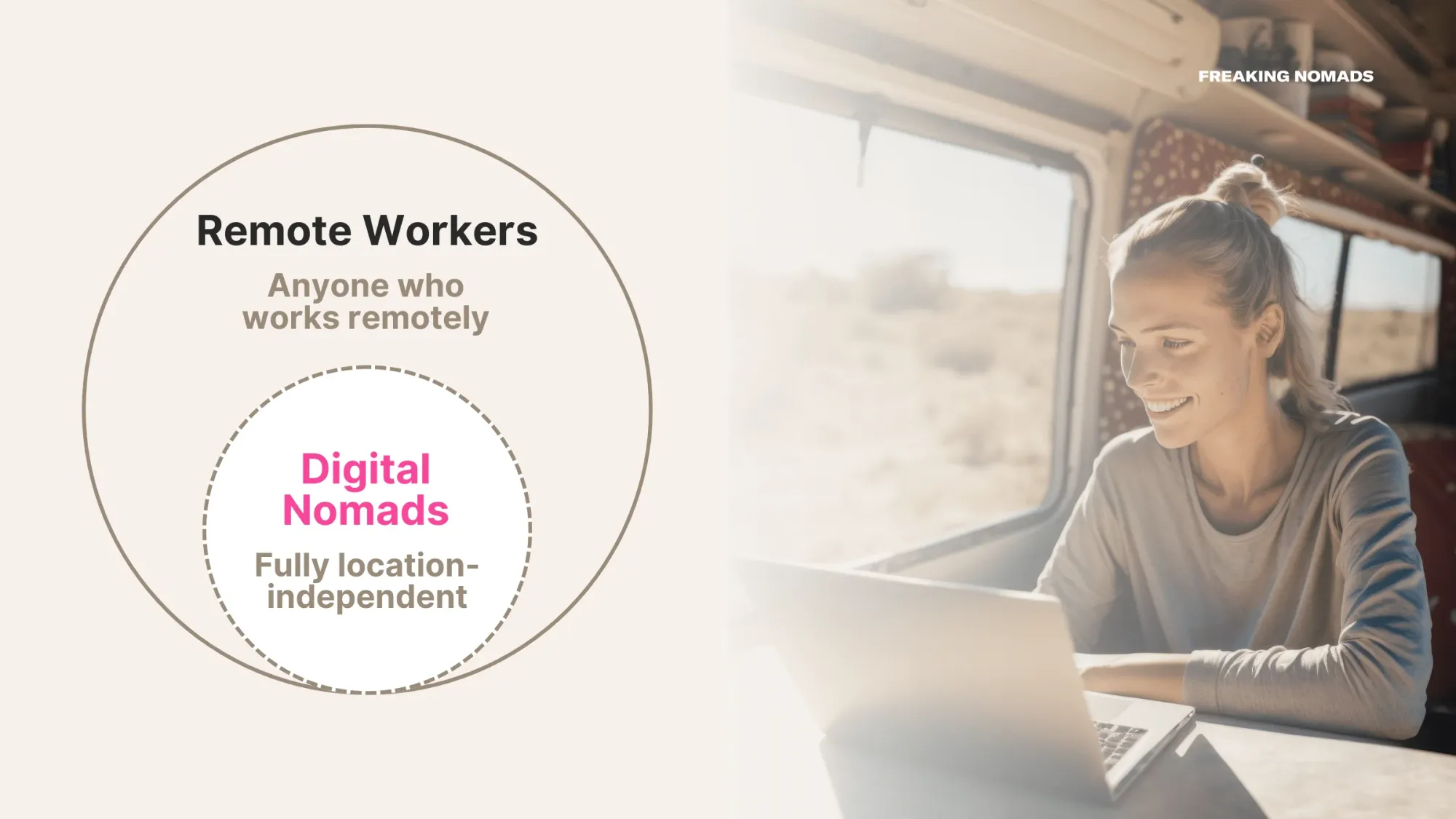
What distinguishes a digital nomad is the prioritization of travel and, usually, a community-seeking mindset. Many digital nomads have to work harder for their communities by working from co-working spaces and attending nomad meet-ups; overcoming the isolation felt without having a permanent home base can be tough. Remote workers who are not digital nomads may not face these challenges to the same degree.
Are Digital Nomads and Expats The Same Thing?
Expats are people who have left their home country to settle in a new country, either temporarily or permanently. Expats may or may not be remote workers or digital nomads. Some expats will have a remote job or will work for themselves, while other expats will have a local job in their country of choice.
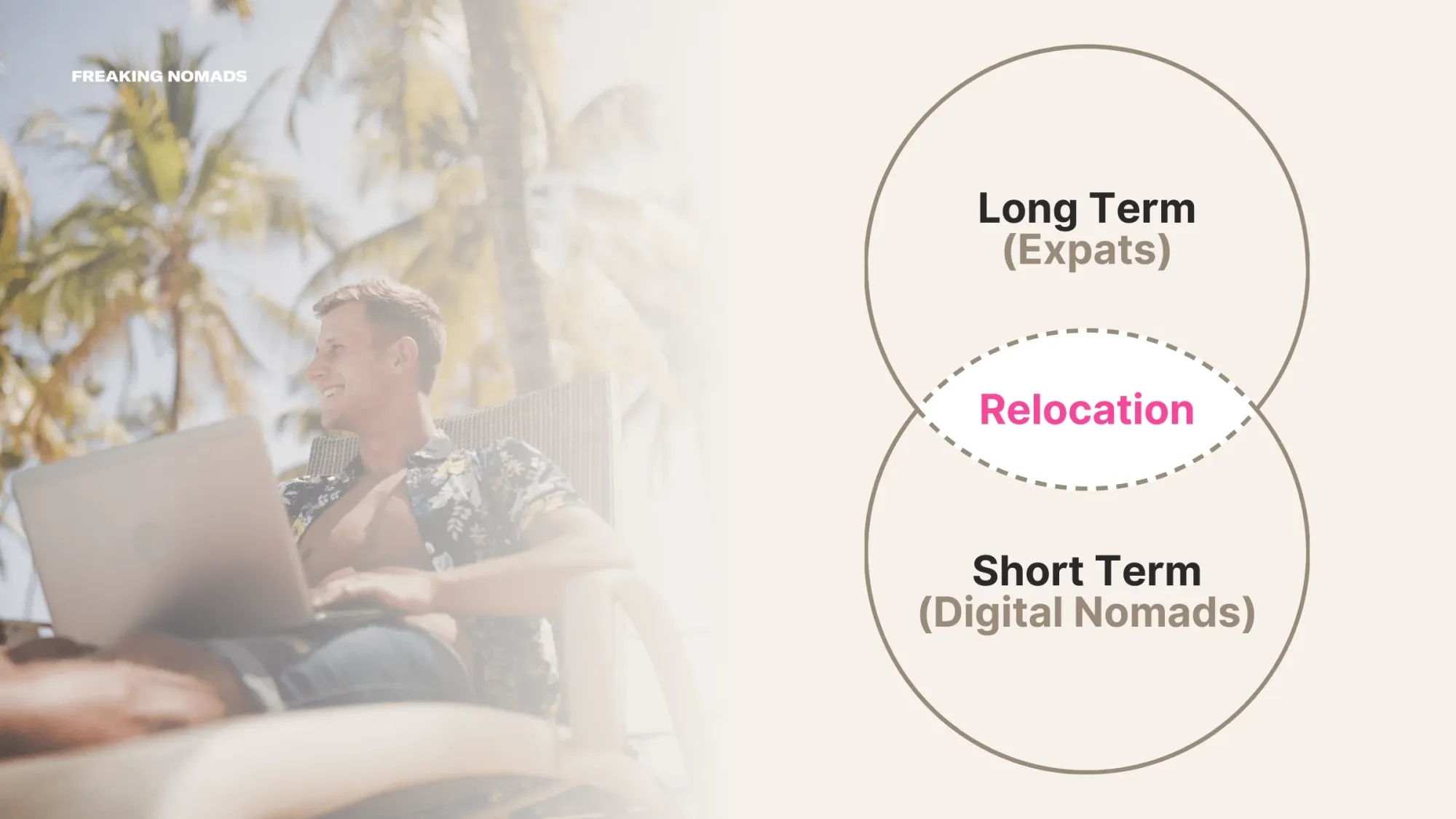
Many expats will have a longer-term apartment lease or even own property in the place they end up settling, so the focus on minimalism may not be as high compared to for digital nomads.
On the other hand, digital nomads may consider themselves to be expats, but some expats may not consider themselves as digital nomads. This is because the focus from the latter group it's not on travel but more on building roots in a certain place.
As a general rule, expats have a longer-term relocation focus while nomads move more frequently, but there isn't necessarily a hard line drawn between the two in terms of time requirements.
Digital Nomads vs Tourists
Digital nomads participate in travel activities that are similar to tourists, but the way of traveling is significantly different.
As a general rule, tourists travel on shorter trips and work very little to not at all while they travel.
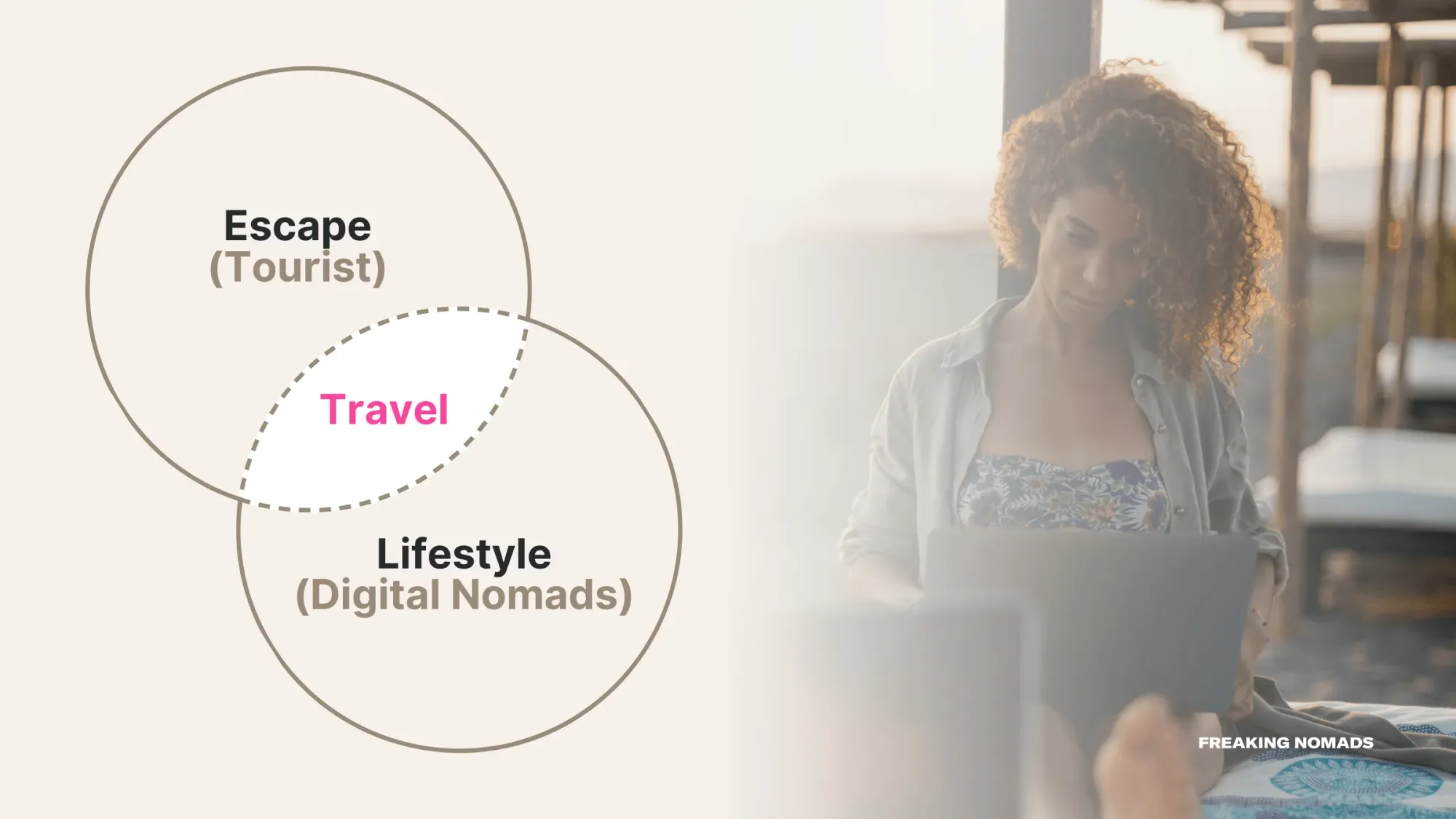
Digital nomads prioritize travel and work and, for them, traveling is a lifestyle, not a simple holiday. They usually have full-time or part-time jobs and tend to travel more slowly and often than tourists.
Digital nomads also tend to engage more with local communities, support more local businesses and form deeper connections within the community due to traveling slower (though generally not to the same degree as expats).
While many tourists are respectful of local culture and want to learn a few basic phrases in the local language while traveling, digital nomads often take this to the next level by enrolling in extended language learning, cooking, or dance classes. Tourists are looking for an escape from their routine, but this is the routine for digital nomads.
Digital Nomads vs Backpackers
Backpackers are a type of tourist who are typically more budget-conscious, typically traveling for a longer time and are often younger.
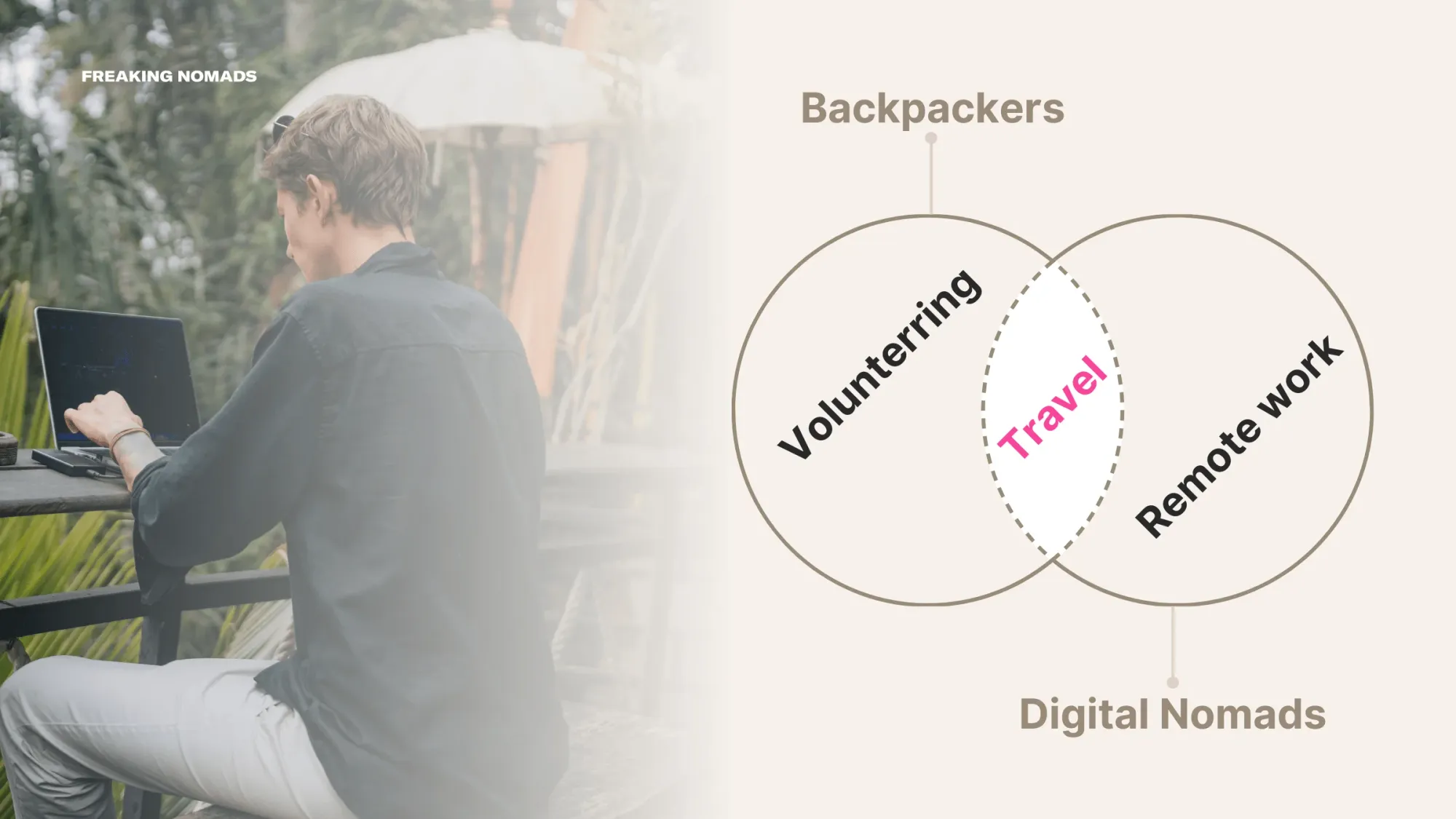
Backpackers are not usually working during their travels and don't need to balance work and exploration in a long-term sustainable way like digital nomads do. Backpackers may choose to volunteer and help local communities to pay for their travels or have some savings aside while digital nomads keep traveling and working at the same time.
What Are the Pros of Being a Digital Nomad?
The digital nomad lifestyle has a ton of perks, and many nomads like me say that they could never imagine going back to the office.
Freedom and Flexibility
Let's be honest, who doesn't want to escape the 9-5 grant and the constraints of office culture? Freedom and flexibility are some of the top perks many digital nomads mention.
Digital nomads love the power to choose where to work from and many digital nomads have significant flexibility over their work hours and can even design their days. This is particularly true for freelancers and entrepreneurs, although employees at very remote-friendly companies can have quite a bit of flexibility over their hours too.
Personal Growth
Digital nomads have significant exposure to personal growth opportunities. By consistently immersing in different cultures, digital nomads can easily broaden their perspective on life and challenge their comfort zone (if they remain open to it).
Travel fosters problem-solving, adaptability and resourcefulness—all qualities/skills that can easily be applied to any part of life.
Potential for Lower Cost of Living
Depending on where digital nomads are from and where they choose to travel, it may be possible to achieve a lower cost of living. Geo-arbitrage is the term that encompasses strategic location choice to stretch your money further.
Some digital nomads choose a lower-cost home base and then travel on shorter trips. These types of digital nomads especially blur the lines between digital nomads and expats.
What Are the Challenges of Being a Digital Nomad?
Though there are a ton of positives about the digital nomad lifestyle, there are also some challenges that should not be underestimated.
Loneliness and Isolation
Most, if not every, digital nomad will admit to feeling lonely and isolated at least once. Being away from family, friends, and other established support systems in addition to normal work and life stress plus content movement can be tough on mental health.
A few things that can help with handling loneliness as a digital nomad include co-working, online communities, and prioritizing social interactions.
Exposure to a more unstable income (for some)
Many digital nomads are freelancers or entrepreneurs, meaning their income isn't as stable as working for an established company. The realities of freelancing mean you'll spend unpaid time finding clients, and work may not always be consistent even when you have clients. It's a good idea to have a financial buffer.
For those who choose to go this route, it's a good idea to start building your client base before going nomadic and to work on building multiple income streams. Luckily, there are a lot of ways to make money online as a digital nomad nowadays.
Staying Productive
Imagine arriving at a new destination you've been waiting to visit forever. It can be a challenge to sit down and get the work done. As a digital nomad, you must have self-discipline and set boundaries between work and leisure. This can be a challenge even for seasoned digital nomads.
Even when you get that self-discipline down, productivity challenges can still be outside your control. You may find that the Wi-Fi at your apartment isn't as reliable as you hoped and some destinations generally may have less stable Wi-Fi, cell networks and even power grids.
A backup mobile hotspot is essential if you work for all but the most flexible jobs (and have the mindset to match). If there are any concerns that a mobile hotspot won't do the trick, there are other internet options that may be worth considering.
Visas and Remote Work Permits
Finally, digital nomads need to take into consideration the legality and tax implications of their nomad travels. Most digital nomads travel on tourist visas, which usually explicitly disallow work. Tourist visas also generally allow shorter stays. Some digital nomads are willing to operate in this grey area and stick to shorter stays.
Other digital nomads look into work-permitted visas, but they're often more expensive and harder to get. Depending on how long you stay in a country, there could be tax implications, so you should consult with an accountant or attorney for your personal situation and plans.
Luckily, we've seen a rise in dedicated digital nomad visas over the past few years. These visas typically permit work for a non-local company, allow longer stays, and exempt workers from paying local taxes. It's still a good idea to consult with your accountant or an attorney.
Which Jobs Digital Nomads Do?
In the digital world, the only limit is your imagination. Talking to other digital nomads over the past couple of years, I've discovered that there are people doing the most different jobs, some of which I never thought existed.

IT skills, such as software and web development are usually the ones that pay the most and offer the most job opportunities over time. It is no coincidence that being a programmer is one of the best-paid jobs.
Another industry in which many people who live this alternative lifestyle work is marketing. Some examples include social media managers, copywriters, or Google ads, and paid social specialists.
Creativity is also highly sought after and, if combined with digital knowledge, is a very strong skill set. Professions that require creativity are designers, videomakers, stylists, and graphic designers, just to mention a few.
Another large chunk of remote work is also done by consultants, including those in SEO, Legal, or Finance.
This is followed by education, another popular field. Many digital nomads work as private Tutors or for companies, schools, and associations. We can also include Yoga Teachers, Personal Trainers, and Coaches in this category.
Writing is yet one of the most used and sought-after skills in many fields. Some professionals who require this essential skill are bloggers, journalists, content writers, and book and scriptwriters.
That being said, I would like to specify that having hard skills or a degree to become a digital nomad is not always necessary. This path is much simpler to achieve and within everyone's reach than you might think.
There are in fact many jobs that do not require specific skills and that companies or businesses are regularly on the lookout for. A few examples are receptionists, customer service assistants, accountants, data entry, or VAs.
The world of remote work for digital nomads is virtually infinite, so there are mainly two important things to keep in mind that will make the difference in making your choice:
- You must choose a job that can be done remotely
- It must match your skills or your natural tendencies as it will be easier for you to learn and carry out a job for which you are inclined.
How Much Do Digital Nomads Make?

The shortest answer to this question is: it depends. It would be too simplistic to provide high-level numbers or figures, but luckily there are statistics that offer us an insight into the average earnings of digital nomads worldwide.
Studies suggest that 1 in 5 digital nomads earn between $50,000 and $100,000 annually.
We also know from research that 49% of digital nomads earn a higher income than when they were employees. The same study suggests that 81% of digital nomads are satisfied with their professional situation.
Digital nomads can then generally expect to earn an average rate of around $10 to $30 per hour.
How Can I Become a Digital Nomad?
Alright, if we have convinced you that the digital nomad lifestyle is amazing and the challenges aren't too much to overcome, you might be now asking: how can you become one?
Here are the steps you need to take to get started on your very own digital nomad journey.
- Connect with current digital nomads
- Understand if the digital nomad lifestyle is right for you
- Figure out how to make money
- Pick the right first destination (and maybe even plan your first few months)
- Figure out the logistics and plan your trip
- Jump in! It's time to work from your first digital nomad destination
- Continue building your digital nomad community
And that's it! Make sure to enjoy your nomadic lifestyle, and don't forget to reevaluate which parts are working and which aren't—make changes accordingly.
The digital nomad lifestyle is amazing. I would know—I've been doing it for over 10 years! While it isn't always easy, and it's definitely not right for everyone, the positives more than outweigh the negatives, in my opinion. I couldn't imagine going back to working in an office.
Interested in Becoming a Digital Nomad?
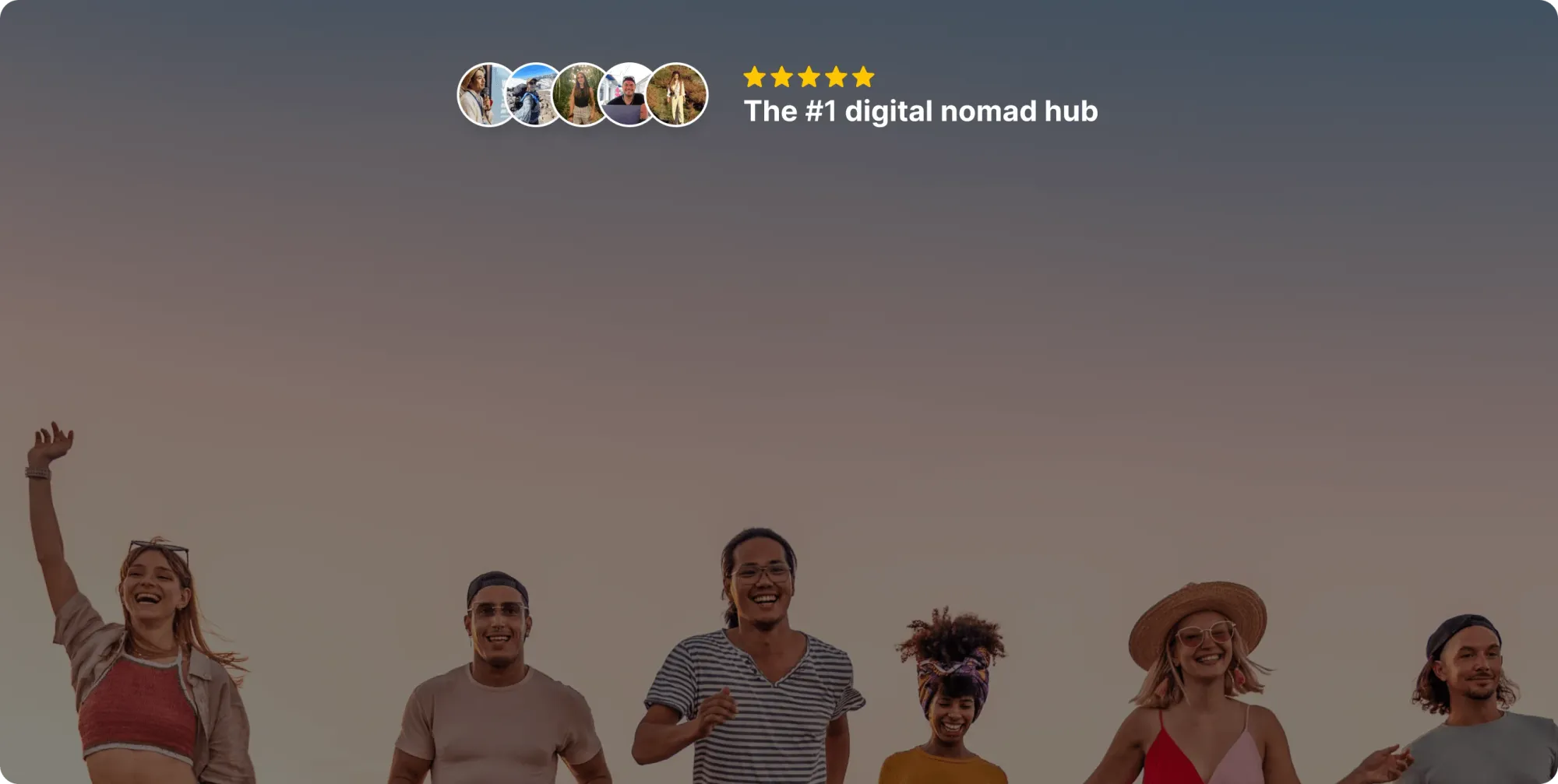
Join our global
digital nomad community
Join us for free
Freaking Nomads is supported by you. Clicking through our links may earn us a small affiliate commission, and that's what allows us to keep producing free, helpful content. Learn more

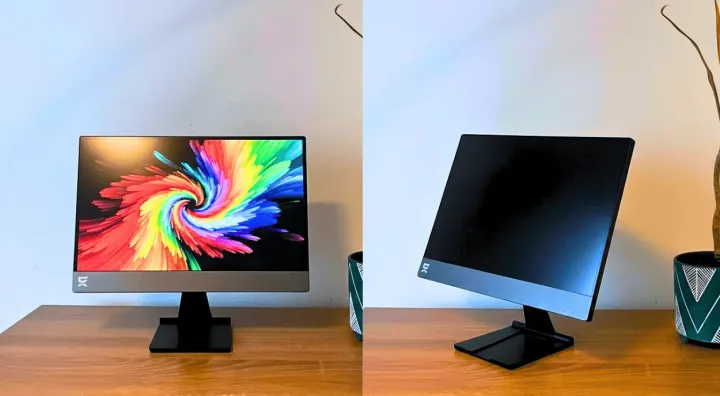


 Travel tips, hacks, and news
Travel tips, hacks, and news Exclusive travel discounts
Exclusive travel discounts Offers and promotions
Offers and promotions Digital nomad inspiration
Digital nomad inspiration Latest articles form our blog
Latest articles form our blog